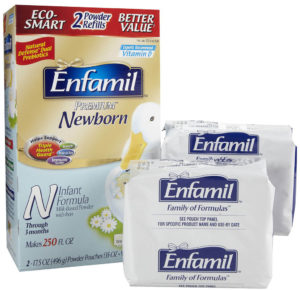Mead Johnson Nutrition Co., the U.S. maker of Enfamil baby formula, was hit with a whistleblower lawsuit just days before the company sold for $16.6 billion to the British condom manufacturer Reckitt Benckiser.
Linda O’Risky, an ex-compliance officer who worked at Mead Johnson and its predecessor for 25 years, says she was denied promotions and ultimately fired after she raised concerns about packaging safety.
O’Risky says she learned about defective seals in March 2015, after receiving an email in which the company said it planned to destroy about 1 million 8-oz packages of ready-to-use Enfamil infant formula. Those leaks could result in product spoilage or contamination.
O’Risky noticed some of the batches had been manufactured several months earlier, suggesting that potentially-contaminated products were released from the manufacturing facility and entered the market.

The lawsuit further accuses Mead Johnson of an “attempt to whitewash and downplay the problem” in the hope that the products “would make their way through the marketplace without any major incidents.”
O’Risky was ultimately terminated in November 2015, which she claims was an illegal retaliatory discharge under Illinois law. She says Mead Johnson only contacted the FDA about the defective seal issues after she complained to OSHA.
In December 2011, Walmart and Supervalu removed Enfamil from store shelves after a 10-day old baby boy died in Missouri of a rare infection with Cronobacter sakazakii. However, the formula was not recalled and Mead Johnson said the batch tested negative for bacteria before it was shipped.
The Centers for Disease Control (CDC) receives about 4 to 6 reports of Cronobacter infections in babies every year, but reporting is not required. It is likely that many more cases are never reported, which makes it hard to track outbreaks to certain products.
Cronobacter is common in the environment. It has also been found in sewer water and unopened bottles of infant formula. This makes it hard to determine if an infection is caused by contaminated infant formula, a non-sterilized bottle, or a caregiver’s unwashed hands.
It does not pose a risk in adults, but Cronobacter infections have a 40% fatality-rate in babies. The infections usually cause sepsis or meningitis in children under 12 months old. The symptoms usually start with fever, poor feeding, crying, and very low energy.
It is an ongoing problem in powdered milk and infant formulas because it is impossible to eliminate from the manufacturing factory. Powdered infant formula is not sterile, which is why parents should choose liquid infant formula when a baby is newborn or very young.
The lawsuit was filed on February 9, 2017 in the U.S. District Court for the Northern District of Illinois — In Re: Linda O’Risky vs. Mead Johnson Nutrition Co. — Case No. 1:17-cv-01046.
Source: Mead Johnson whistleblower lawsuit claims baby formula packaging defective

I live in California my daughter is three months now we just took her off of that one she’s in regular emfamil infent now should I be a paranoid father right now with infant formula is it should I persue a lawsuit my baby not sick thank good but now I’m a little afraid by that now alphonzo holloway